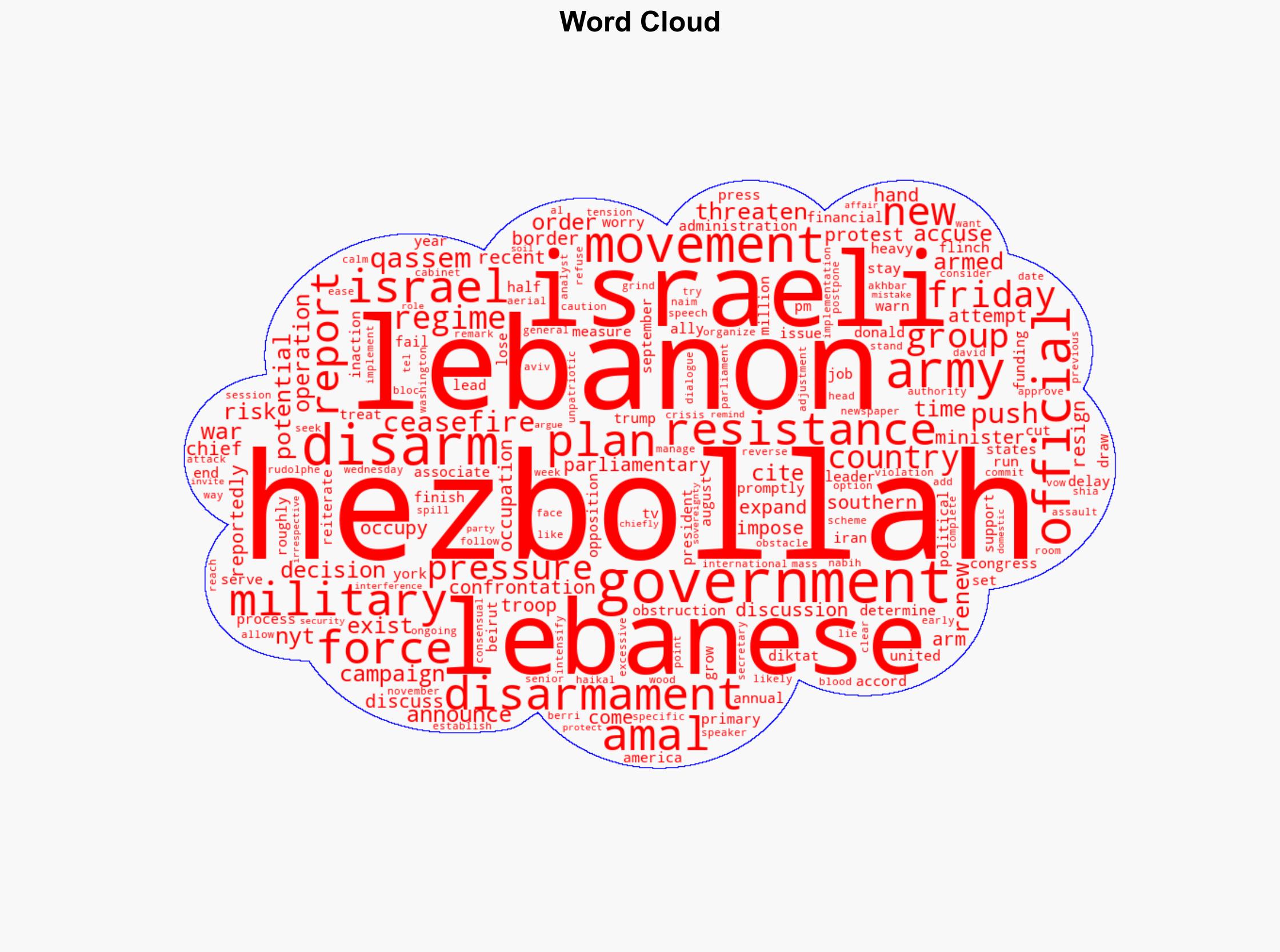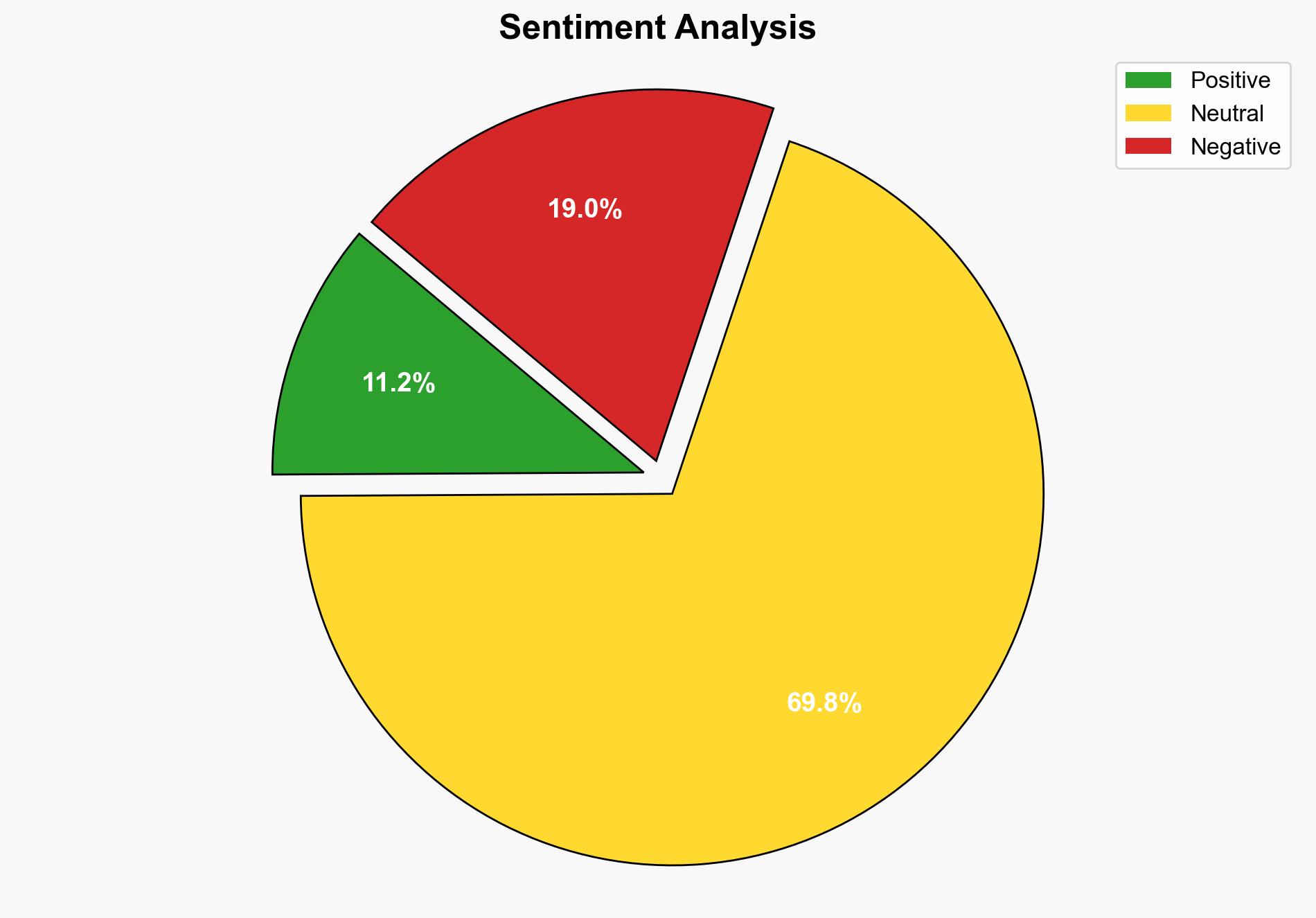US threatens Lebanon with ‘new Israeli war’ if Hezbollah stays armed Report – Globalsecurity.org
Published on: 2025-09-06
Intelligence Report: US Threatens Lebanon with ‘New Israeli War’ if Hezbollah Stays Armed
1. BLUF (Bottom Line Up Front)
The strategic judgment is that the US threat of a renewed Israeli military campaign against Lebanon is a significant pressure tactic aimed at disarming Hezbollah. The most supported hypothesis is that this is a coordinated effort between the US and Israel to weaken Hezbollah’s influence in Lebanon. Confidence level: Moderate. Recommended action: Diplomatic engagement with Lebanese stakeholders to address security concerns while avoiding escalation.
2. Competing Hypotheses
1. **Coordinated US-Israel Strategy**: The US and Israel are working together to pressure Lebanon into disarming Hezbollah, using the threat of military action as leverage. This hypothesis is supported by the alignment of US and Israeli interests in reducing Hezbollah’s military capabilities and the historical context of US-Israel cooperation.
2. **US Independent Pressure**: The US is acting independently to pressure Lebanon, primarily to reduce Hezbollah’s influence and align Lebanon more closely with Western interests. This hypothesis considers the possibility of US unilateral action motivated by broader geopolitical objectives, such as countering Iranian influence in the region.
Using the Analysis of Competing Hypotheses (ACH) 2.0, the first hypothesis is better supported due to the consistent alignment of US and Israeli statements and actions, as well as historical precedents of cooperation.
3. Key Assumptions and Red Flags
– **Assumptions**: It is assumed that both the US and Israel have the capability and willingness to follow through on military threats. It is also assumed that Hezbollah’s disarmament is a primary goal for both nations.
– **Red Flags**: The potential for misinterpretation of US intentions by Lebanese factions could lead to unintended escalation. There is also a risk of underestimating Hezbollah’s resilience and local support.
– **Blind Spots**: The internal dynamics within Lebanon, including the influence of Hezbollah’s political allies, may not be fully accounted for in the US-Israeli strategy.
4. Implications and Strategic Risks
– **Escalation**: A military confrontation could destabilize Lebanon further, leading to regional instability.
– **Economic Impact**: Renewed conflict could disrupt economic activities and international aid, exacerbating Lebanon’s financial crisis.
– **Geopolitical Dynamics**: Increased tensions could draw in regional powers like Iran, complicating diplomatic resolutions.
– **Psychological Impact**: The threat of war may increase public support for Hezbollah as a defender against external aggression.
5. Recommendations and Outlook
- Engage in multilateral diplomacy involving regional stakeholders to de-escalate tensions and address security concerns.
- Encourage confidence-building measures between Lebanon and Israel to reduce the risk of miscalculation.
- Scenario Projections:
- Best Case: Diplomatic resolution leads to a phased disarmament of Hezbollah with international oversight.
- Worst Case: Military conflict erupts, leading to widespread regional instability.
- Most Likely: Continued diplomatic pressure with intermittent escalations short of full-scale conflict.
6. Key Individuals and Entities
– Donald Trump
– Naim Qassem
– Nabih Berri
– Rudolphe Haikal
7. Thematic Tags
national security threats, regional focus, geopolitical strategy, military escalation





